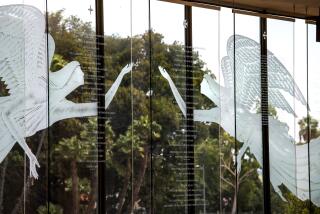Feast of Epiphany Is Acknowledgment of Jesus as Savior
- Share via
When I go up to the mountains for a hike, I experience a sense of unity with things natural. It usually takes me a couple of days to purge myself of civilization to be in tune with my surroundings, as well as getting my body accustomed to the new stresses and strains of altitude and a heavy backpack. Once the “purging” has taken place, my surroundings become live. The colors, sounds and smells speak to me of a tremendous spirit of life coursing through all of creation.
It is the memory of these experiences that allows me to identify with the mysterious magi who came looking for the newborn King of the Jews.
Epiphany, which marks the end of the 12 days of Christmas, is the time the Christian church celebrates the story of the coming of the magi to visit the newborn Jesus in Bethlehem, according to the Gospel of Matthew.
Over time, these magi have been transformed into kings from the east; but in the correct terminology, the word “magi” means magician or wizard. These were men who had studied the forces of the Earth and had figured out how to use these forces to cast spells and do magic. They were skilled at reading the changes occurring in nature and at assigning meaning to these changes.
There are great debates among New Testament scholars as to the authenticity of the coming of the magi to Bethlehem. I will leave the debating to them and focus on the significance of this story for us today. I write from a Christian perspective, so for me the events related to us through the Gospel of Matthew point to the recognition of Jesus as the Messiah, the Son of God, the Savior of humankind.
Many of my colleagues in the Christian ministry bemoan the loss of pity and spirituality seen in the lives of the people. I see something very different happening in people’s lives. I see people becoming more spiritual and searching for an authentic expression of their experiences.
The rise of psychic readers and the involvement of many people in religious experiences other than Christian experiences speaks to me of the need people have to fill the void in their lives that result of the advances in science and technology.
As we understand the forces of creation, we still wonder about the unifying force we sense, but which we cannot explain or express. This searching is authentic. We in Christian circles cannot afford to scoff at or ridicule these efforts. If we are honest with ourselves, we must admit to our own ongoing search and claim the blessed grace that allowed for our own epiphany, our coming to acknowledge Jesus as Savior and Lord.
The feast of Epiphany for Christians is the acknowledgment of Christ Jesus being recognized, accepted, and embraced by a pagan world. The three magi used their observations of nature and natural reason to arrive at the knowledge of Christ.
The challenge for us Christians today is to acknowledge that many people are authentically searching for the truth of the divine and have not arrived at the same recognition of Jesus as we have. It has not been by our own powers of reason that we as Christians accept Jesus as Lord and Savior; instead this knowledge has come through intervention. This divine intervention we call faith.
Our response to others who are searching should be one of great respect, humility, compassion and love. We should not think of ourselves as being superior to anyone. We should be humbled by their searching and questioning. We should be inspired by this searching and questioning. Believing in Jesus means being invited to join in the mystery of His divinity and to more deeply experience God’s love.
If anything, this feast of Epiphany is a call for all to recognize the powerful, yet mysterious ways God works in nature and in human lives. This God we worship refuses to be boxed in by our definition of religious experiences. Instead, He touches each person in ways that can be understood and accepted. If the God of all creation is this respectful and caring toward each person, shouldn’t we be the same?
Rev. Robillard is pastor of St. Joachim Catholic Church in Costa Mesa.
On Faith is a forum for Orange County clergy and others to offer their views on religious topics of general interest. Submissions, which will be published at the discretion of The Times and are subject to editing, should be delivered to Orange County religion page editor Jack Robinson at 1375 Sunflower Ave., Costa Mesa, CA 92626. Submissions also may be faxed to (714) 966-7711 or e-mailed to jack.robinson@latimes.com.


